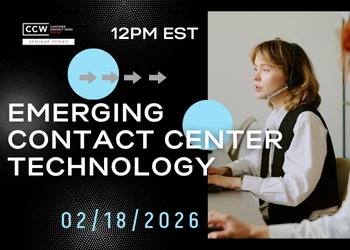Meritocracy Part 2: Overcoming the Fear Factor
Add bookmark
As the CEO of LiveOps, I talk a lot about the opportunity of flexibility for both companies and workers. Flexibility has become a modern day value that everyone wants.
But flexibility comes with a cost. The cost is accountability, which is necessary to gain the opportunity to work where you want, when you want, and how you want. Just as it is in pro sports (http://blogs.liveops.com/2010/06/16/meritocracy-part-1-world-cup-fever/), being managed by outcomes, maintaining an outstanding record, and doing something to get voted onto the team every day is mandatory to make our system work. What gets me most excited though is what accountability yields: a work environment ruled by meritocracy. The result is a new culture that is better for workers, better for the company, and better for customers.
I came out of retirement to work at LiveOps because of the opportunity to support and promote such a culture. Meritocracy is at the heart of LiveOps' business. Our technology platform tracks real-time information about our independent agents’ results. All of the freelancers who use our platform for work have access to this data. The technology also provides access to information about how each freelancer compares to other independent agents, creating a healthy sense of competition and providing incentive for improvement.
The Rise of ROWE (Results-Only Oriented Work)
This isn’t a new concept. In fact, many companies today pride themselves on rewarding performance versus tenure. Take for instance Best Buy and the success it has had with a Results-Only Work Environment (ROWE). (If you haven’t read the book Work Sucks, by the two former Best Buy employees who pioneered ROWE, I recommend it.) I know the rewards of focusing on innovation and outcomes as opposed to hours. I’ve been fortunate to work with brilliant entrepreneurs who didn’t have years of experience and yet they changed the world. Pierre Omidyar was a programmer who built eBay over Labor Day weekend in 1995 and Omar Hamoui dropped out of grad school to found AdMob, which created new capability for the mobile web.
As we have seen through LiveOps’ growth, a merit-based model has major advantages for our business, as well as the people who work with us. Our community of independent agents enjoys immediate and transparent rewards in the form of more calls and opportunities. That results in more revenue for their home-based businesses. With results as the key indicator, it also means that LiveOps' customers are more likely to have a top performing agent answer their calls. LiveOps has proven that the merit-based system drives amazing outcomes: We consistently outperform other contact center service providers by earning, on average, 30 percent more revenue per campaign.
The Importance of Fostering a Flexible Work Environment
Meritocracy defines what we do at LiveOps, but it doesn’t just apply to independent contractors. All companies can benefit from fostering a more flexible environment (creating a place where the most talented, industrious, and entrepreneurial people want to work) and relinquishing hierarchical control to favor a results-oriented meritocracy. We see the benefits from early adopters like Accenture, BT, Gap, Google, and Unilever—each of which has explored more flexible work practices to allow employees to work anytime, anywhere. Given the talent shortage that is coming, I believe that elite companies will begin bidding wars to ensure they are getting the top talent—making this flexibility even more imperative.
Interest in flexibility is not just in the private sector. Recently, the White House Council on Women and Girls hosted, "The Forum on Workplace Flexibility." The event attracted leaders in business and government who met to discuss best practices for creating successful alternatives to the traditional office environment. A report by the White House Council of Economic Advisers released during the Forum found great benefits for both employers and employees. According to the report, companies with flexible work arrangements enjoy lower turnover and absenteeism, higher productivity, and healthier workers. In addition, the White House Executive Office of the President announced during the Forum that they would begin adopting ROWE. (Check out Terrell McSweeny, Domestic Policy Advisor to the Vice President’s, review of the event, or the blog by LiveOps Director of Workforce Innovation, Regan Parker, for more on the Forum and government initiatives aimed at workplace flexibility.)
It’s fantastic that the world is becoming more open to different ways of working, but we still have a long way to go in terms of changing perceptions. Today, many people still fear the instability of freelance work. But there’s instability with traditional work too. If you consider the current state of the economy, I would question whether any job is truly safe, offering lifetime job security and benefits. I would contend that the days of the paternalistic company are long gone.
To me, this fear of perceived instability and the clinging to the safety net of the lifelong job prevents us from reaching our potential as innovators. The U.S. is struggling to compete with countries that are constantly developing the next gen technologies and companies. We need to embrace change and realize that this IS the future of work. (As I’ve said before, work is the next killer app.) So, let's not stifle ambition, but help people work in ways that help them reach their full potential and pursue their dreams. Playing it safe does not fuel growth for our companies. It does not create personal freedom. And it will never change the world.
First published on Call Center IQ









